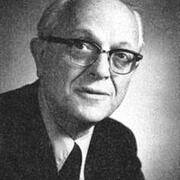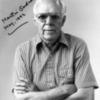Anatol Rapoport (1911–2007)
Author of Two-Person Game Theory (Dover Books on Mathematics)
About the Author
Anatol Rapoport is Professor Emeritus of Psychology and Mathematics at the University of Toronto. He has been the recipient of many awards, including the Lenz International Peace Research Prize and the Harold D. Lasswell Award for Distinguished Scientific Contributions to Political Psychology, and show more honorary doctorates, of Human Letters (University of Western Michigan), of Laws (University of Toronto), of Science (Royal Military College), and of Sociology (University of Bern) show less
Works by Anatol Rapoport
Mathematical Models in the Social and Behavioural Sciences (A Wiley inter-science publication) (1983) 5 copies
Marx vivo: la presenza di Karl Marx nel pensiero contemporaneo (1969) — Contributor — 4 copies, 1 review
Tagged
Common Knowledge
- Canonical name
- Rapoport, Anatol
- Birthdate
- 1911-05-22
- Date of death
- 2007-01-20
- Gender
- male
- Nationality
- USA (naturalised)
Russia (birth) - Birthplace
- Lozovaya, Kharkov Region, Russia
- Place of death
- Toronto, Ontario, Canada
- Places of residence
- Lozоvaya, Russia (birth)
Toronto, Ontario, Canada
USA
Vienna, Austria - Education
- University of Chicago (PhD ∙ Mathematics ∙ 1941)
Hochschule für Musik, Vienna - Occupations
- professor (Mathematical Biology ∙ University of Michigan ∙ 1955-1970)
professor (Mathematics and Psychology ∙ University of Toronto ∙ 1970-1979)
Director, Institute of Advanced Studies, Vienna, Austria - Organizations
- US Army Air Corps (WWII)
Society for General Systems Research (co-founder)
Members
Reviews
You May Also Like
Associated Authors
Statistics
- Works
- 23
- Members
- 343
- Popularity
- #69,543
- Rating
- 3.8
- Reviews
- 3
- ISBNs
- 37
- Languages
- 2
- Favorited
- 1










This is a book about what is called "game theory," but the title tells you what it's really about: Choosing the best strategy when confronted with a particular situation. And trying to do the right thing while you're about it.
Game theory books have a problem: How much pure mathematics to throw at you. The more math they use, the more problems you can solve -- but the fewer people who can keep up. So the book vary greatly in how much computation to require. This book is toward the lower end of the list, but it isn't purely descriptive. You'll have to be prepared to do a little work. It's worth it, though, because -- unlike some game theory texts -- it really does look at the moral dimensions of things. What does it mean to "defect" in a game like Prisoner's Dilemma? Is it just cutting ahead in line -- or is it launching a nuclear strike? And does this affect what you do?
These questions weren't answered when Rapoport wrote, and still aren't answered today. This book is far from a last word; a lot of good progress has been made since his time. But much of what he wrote is still worth thinking about. It's an old book, but still a good book.… (more)